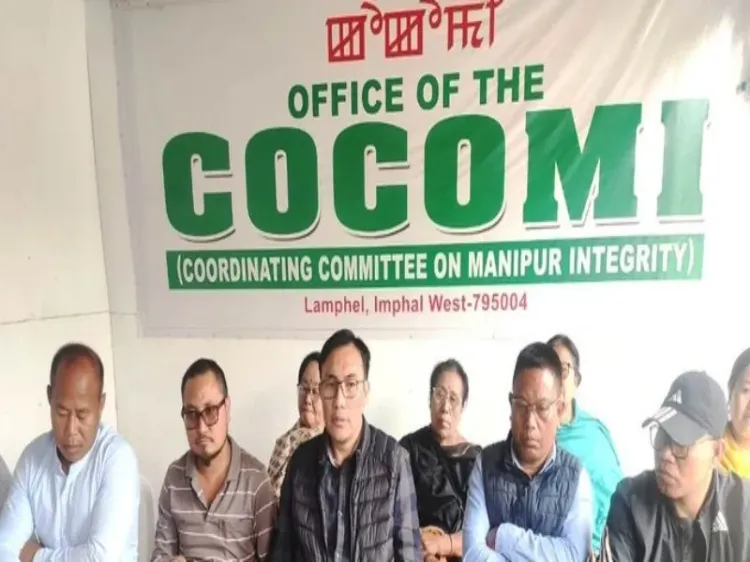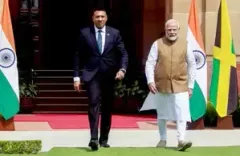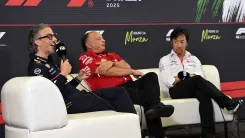Why is the Apex Meitei Body Opposing the Suspension of Operations Pact with Kuki Militants?

Synopsis
Key Takeaways
- COCOMI opposes the extension of the SoO agreement, citing concerns for indigenous rights.
- The decision has raised questions about the government's legitimacy under President's Rule.
- There are apprehensions regarding the rise of narco-terrorism in the region.
- The Imphal-Dimapur National Highway remains crucial for connectivity.
- The community's safety and rights are at the forefront of ongoing discussions.
Imphal, Sep 5 (NationPress) Following the Centre's signing of a tripartite agreement with Kuki militants to prolong the Suspension of Operations (SoO) for an additional year, the Coordinating Committee on Manipur Integrity (COCOMI), a leading Meitei organization, vehemently condemned the arrangement on Friday.
COCOMI asserted that the extension of the SoO, despite numerous acts of terrorism and crime executed by 'Chin-Kuki armed narco-terrorist groups', undermines the interests of Manipur's indigenous population.
“COCOMI reiterates its firm opposition to this government of India’s anti-people initiative. The democratically elected government of Manipur had, via a Cabinet decision on March 10, 2023, unanimously resolved to annul the SoO agreement,” the Meitei organization stated.
Laikhuram Jayenta, Convenor of the Information and Public Relations Sub-Committee, indicated that under the present President’s Rule, the governance is managed by an authority assigned from Delhi, lacking the legitimacy to faithfully represent the people of Manipur.
The statement emphasized that the decision to prolong the SoO under these conditions is illegitimate and exhibits an undemocratic imposition on the indigenous people and their elected representatives in Manipur.
“By providing excessive legitimacy and acknowledgment to armed Chin-Kuki narco-terrorist factions through this deceptive SoO agreement, the government of India has cast serious doubts on its capacity to address narco-terrorism in the area. Since the inception of the SoO in 2005 and 2008, these agreements have merely protected narco-terrorist groups while undermining the democratic voice of the populace,” it remarked.
COCOMI asserted that the global community would also scrutinize India’s credibility in tackling narco-terrorism when it appears to be offering safe passage and immunity to such factions.
The Meitei organization accused the Government of India of willfully ignoring the unanimous resolution of the Manipur Assembly passed on February 29, 2024, urging the government of India to revoke the SoO.
COCOMI pointed out that the administration under President’s Rule in Manipur has been included in the tripartite discussions without any mandate from the populace.
“This situation signifies a total betrayal of the foundational tenets of democracy. The Constitution of India guarantees every citizen the fundamental right to free movement across the nation,” the group stated.
COCOMI noted that by utilizing this as a bargaining tool with armed narco-terrorist groups, the government of India has violated its own constitutional responsibilities.
“Such actions give the impression that the Government is holding the Meetei community hostage under the influence of narco-terrorists. This is utterly intolerable to the people of Manipur. Taking all these factors into account, COCOMI vehemently rejects the government of India’s extension of the SoO agreement,” the statement concluded.
This decision will always be perceived as an endorsement of narcoterrorist activities, granting them immunity through a deceptive agreement, while jeopardizing the rights, security, and future of the indigenous population of Manipur and the wider Northeast region, as expressed by the Meitei organization.
A senior official indicated on Thursday that the tripartite Suspension of Operations (SoO) agreement with Kuki militants has also been renewed for one more year following a meeting involving officials from the Ministry of Home Affairs (MHA), the Manipur government, and leaders from the Kuki National Organisation (KNO) and the United People’s Front (UPF).
The UPF and KNO, which comprise a coalition of 24 underground factions, originally signed a SoO with the government on August 22, 2008, with 2,266 members from these militant groups currently residing in designated camps throughout Manipur’s hilly areas.
After discussions among MHA officials, the Manipur government, and Kuki-Zo Council (KZC) leaders, the Centre announced on Thursday that the KZC has chosen to open the Imphal-Dimapur National Highway (NH-2) to facilitate the free flow of commuters and essential supplies.
The NH-2 serves as one of Manipur’s lifelines, while the region is also linked to the rest of the country via another crucial route, the Imphal-Jiribam National Highway (NH-37).
In the meantime, the KZC clarified in a statement on Thursday that the MHA has expressed significant concern regarding the safety of commuters on NH-2 (Imphal-Dimapur) passing through Kangpokpi district, and it “hereby clarifies that no adverse incidents have occurred recently affecting either commuters or the transportation of essential goods on NH-2.”





